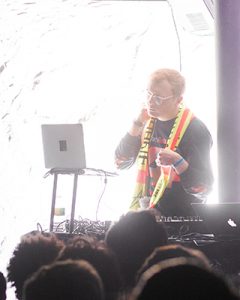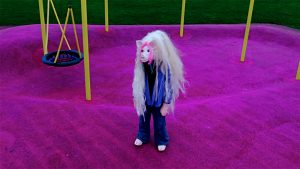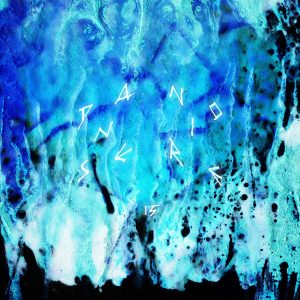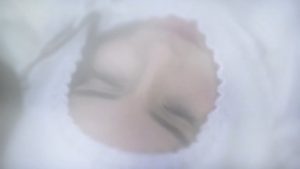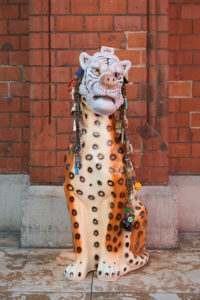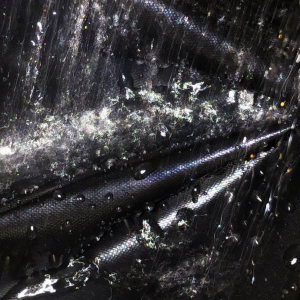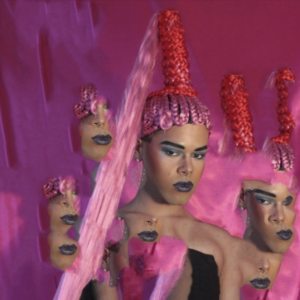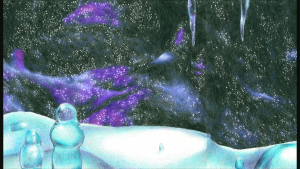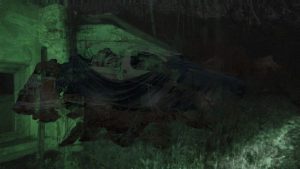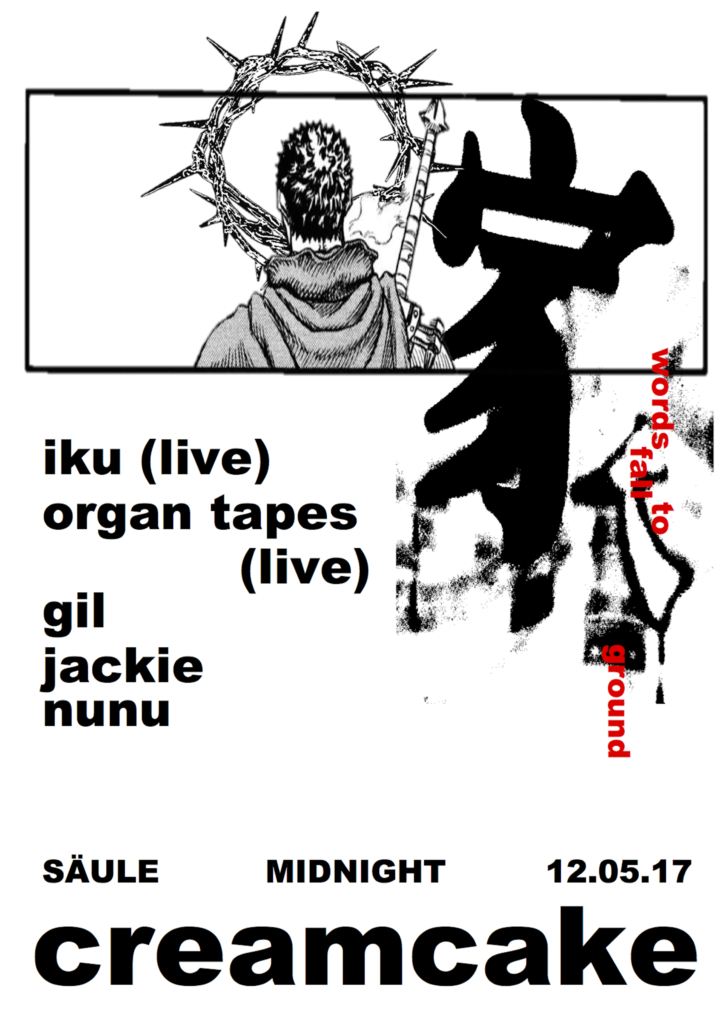
“Part of me thinks that underpinning the impulse to champion newness is the same logic that leads to uncritically championing new technologies and what often amounts to new modes of exploitation in the name of efficiency, convenience or so-called progress.” So explains producer Organ Tapes (aka Timothy Zha) in a conversation over email when asked about newness and the influence of popular and counter-cultural influences on his work.
Zha released his latest EP Words Fall to Ground online via Berlin-based label Creamcake on May 5, with contributions from ssaliva, Malibu + Soda Plains. Here, sourced sounds that are ‘personal and/or compelling’ to him, come together with original production to create moods that meander through raw noise samples and nostalgic club and pop sounds, all softened by Auto-Tuned vocals. Launched at Berghain’s new Säule club on May 12, the EP landed in an event also featured Iku, GIL, Jackie, and Nunu, following a previous release called Word Life via Tobago Tracks in 2015.
In a conversation about authenticity, the experience of being bodied and the condition of being fallen, Zha talks to us about his influences, his background in literature and the need to reframe how we understand authenticity.
** Can you talk about the collaborative process with the other artists featured on the album?
Timothy Zha: I met Malibu in the summer of 2015 and we immediately made a handful of songs together, but some of them never really got finished. There were a couple I kept coming back to and ‘Guess Riddim‘ was one of them. A demo version was in an unaired mix we made for Precious Metals sometime in 2015.
ssaliva is someone I’d been a fan of for a long time. He reached out and sent me some really beautiful stems, which I then added some bits to and sang over. Like ‘Guess Riddim,’ it lay dormant for a pretty long time before getting resurrected for this EP.
The song with Soda Plains just came from having met a few times in Berlin and London and having mutual friends leading to him sending me a few beats. I remember, with [‘Turned’], I recorded it and finished my vocals like the day after he sent it, which is a pretty rare thing because I normally take forever to get back to people when collaborating over the internet. 杂种 linkup 😉
I fully back all three of them and I’m really thankful they were cool with me releasing these songs we made.

** Where do you think your approach to music production sits in a timeline of remix and mashup culture?
TZ: I wouldn’t describe my own productions as within that tradition really as they’re predominantly comprised of music I’ve written and recorded myself. I don’t usually sample any recognisable melodies or drums, which I think places them outside what would normally be considered a remix or mashup.
I make a lot of edits for mixes and live sets that are constructed pretty much in the ‘traditional’ vein of the original mashup DJs, like Girl Talk or The Hood Internet, or whoever else was making the mashup ‘genre’ big in like 2008, although obviously I think our sensibilities differ. Elysia Crampton‘s old E+E edits are a big influence on the way I approach remixes. On the more club-focused side of things, Manara and 2K make incredible edits. Estoc as well is another contemporary that makes insane edits. Same goes for v1984, foozool, DJ Pitch and 8ulentina, just off the top of my head. I guess the common thread is that everyone I just mentioned is Frankenstein-ing sounds together that, however disparate, in some way speak of their curators’ unique and powerful sensibilities.
** I ask because there’s been much discussion about contemporary aesthetics of appropriation and you mention in an interview that “nothing I make really originates entirely from ‘me’ in any pure sense.” Do you think could expand on what you mean by this?
TZ: I was reading a Terre Thaemlitz interview not too long ago that explained this extremely well:
“I’m all about using samples in a footnote kind of way, and also using them to get away from originality and to get away from these gestures of expressing the self in some sort of one-to-one, pure, coming-from-the-heart musician’s bullshit via ‘original compositions.’ In the end, even if you’re attempting to mediate affect and convey a strictly emotional message, that’s still really heavily coded through musical structures. It’s not pure emotion. You’re using social languages of music and genres to convey signs of emotions. So for me, yeah, samples are really a deliberate way to minimize that conventional belief in the ‘authentic’ musician’s gesture behind the tracks.”
This rejection of authenticity isn’t to say that discourses around cultural appropriation are irrelevant; the idea that originality is an un-useful concept in the way it’s usually understood (i.e. as ‘pure,’ ‘authentic’ expression) isn’t so we can then cynically declare everything fair game for plundering. It’s a reframing of how we understand authenticity, an acknowledgement of the fact that when we create we use ‘social languages,’ we inhabit tradition and enter into dialogue with history. It’s a rejection of the idea that music or any art can be ahistorical, and its an acknowledgement of the importance of discourses around cultural appropriation, because we can never create under the illusion of ‘pure’ authenticity, the illusion of ahistoricity, without having to consider our relation to the lineage and history of the ‘social languages’ we utilise and inhabit.

Authenticity becomes about the honesty and thoughtfulness of these relations, rather than misguidedly and naively striving for the absence of these relations. I think literature, which is what I studied at uni, generally does a better job of acknowledging this than musicians, who tend to champion individuality and their own specialness a lot more. There’s a strongly individualistic ideology implied in understanding authenticity as an absence of these relations, while acknowledging traditional authenticity’s irrelevance is also to reject the idea of yourself as some kind of special anointed individual artistic genius and accept your place among the many, to accept that your artistic identity is always comprised of many and always inherently collaborative in some sense.
** You released this EP on Good Friday. It also features some religious motifs, which also this happens on your previous release. Given you don’t necessarily identify with Christianity anymore, do you consider your work in terms of a search for a contemporary sacred?
TZ: The timing of the release was actually partly just a coincidence. Although, yeah, I guess it was a fitting one. Christianity is a part of who I am and Christian ways of thinking and theology inform and shape my understandings of so many things. My relationship and love for music is something I’m sure is influenced by and born out of my Christian upbringing from my mum. She’s not from a particularly religious family and really came to her faith on her own, so I’ve always had this understanding of Christianity as a very personal thing, concerned with direct communion with God, rather than a kind of cultural identity (not that these two understandings are incompatible). So, it’s always been something of great primacy to me rather than a kind of background presence. Some of the earliest contexts in which I experienced music would’ve been churches, so music is pretty inseparably tied to spirituality for me. I think that their roles in my life have become conflated.
The EP’s title actually comes from Wide Sargasso Sea by Jean Rhys when the protagonist recounting her youth recalls: “I prayed, but the words fell to the ground, meaning nothing,” but I discovered afterwards that this was probably a reference to 1 Samuel 3:19, which is sometimes translated as, “The Lord was with Samuel as he grew, and he let none of Samuel’s words fall to the ground”.
I wouldn’t say I consider my work in terms of a search for a specifically contemporary sacred, no, but I do think that, like Christianity, it’s concerned with understanding the experience of subjectivity, the experience of being bodied, which to me is always dominated and defined by the condition of being ‘fallen’ in a biblical sense; the condition of being irreparably separate from God, except through the mechanism of faith.**
Organ Tapes’ Words Fall to Ground EP was released via Berlin’s Creamcake on May 5, 2017.


